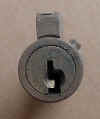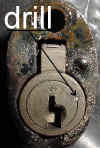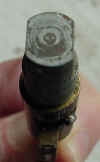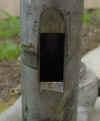BMW motorcycle fork steering lock removal and replacement |
|
Remove the "boat shaped" chrome steering lock cover These are the three pieces that will come flying off, so catch them. The fork lock can be removed in four ways, depending upon conditions.1. Do you have the Neimann key? Remove the chrome lock cover shown above. Stick the key into the keyhole, turn it to the left till it stops, at about 10 O'clock, wiggle the forks a bit and pull the whole thing out. The spring should shove it out. Easy huh? It will look like this. 2. You may be able to pick the lock yourself. Go to this website for the explanation by Charlie. Many won't be able to pick the lock. Here you can learn more than you ever wanted to know about lock picking. All else fails, take it to a locksmith. 3. No key and a bare frame. This sacrifices the lock, but you don't have a key anyway. Use a drift with a flat end and drive the lock into the frame about 3/8." That will shear off the screw holding the lock. Use a lever down in the steering stem hole and push the lock out. 4. No key and the bike is assembled. This is the most common case. One common suggestion is to "drill it out." Never stick a drill into the key hole and start drilling. You will hit the tumblers made of hardened steel and the drill will break off. Now you do have a problem. This is how to do it. This is so slick. It was first suggested to me in 1972, by Bryan Hilton, my genius mechanic. It would help to have the new lock in your possession so that you can examine it carefully to see what is otherwise "hidden" in the frame. The job is so easy though, that you probably can proceed by looking at these photos. Here are two pictures to show the lock. In the first picture you can see the small screw in the middle of the lock. In the picture from above, you can see the screw sticking out from the round barrel at about 2 O'clock. The part at 12 O'clock is the assembly that holds the tumblers. The idea is to drill a hole into the lock and cut the head of the screw off from underneath. It sounds hard, but is actually quite easy. Use a sharp center punch to make a dent in the lock at midway between 2 and 3 O'clock. I use a center punch to mark the place for the hole. I use a 1/8" drill bit. The main thing is to aim at the screw that you can't see. Most likely you will only partially cut the screw off. You can drill as far as 7/8" before you will go all of the way through the lock and hit the frame. Don't fret, you can gently tap on the lock and see if it will finish the job. If you can't finish breaking off the screw, then go up to the next size drill bit. You could force/screw a small bolt into the new hole and pull on it, but I have never had to do that. With the lock out, carefully examine the hole in the frame and remove any metal shards. Carefully turn the forks while peering into the hole and see if the matching hole in the steering stem is narrow or widened out. That is evidence of someone trying to break the lock, as in a botched theft. Upon reassembly, you will find that the "nail" that holds the chrome cover on the lock, will stay in. Just tap it in gently. Rich Thrush said "the new lock mechanism that I ordered did not have the flats on the steel cylindrical portion." Apparently the new fork locks don't have the flats machined on the side. The shaft that protrudes into the steering stem is round. It won't fit into the slot in the stem. Here are some measurements to allow you to fix it. The slot in the steering stem is .402" wide and the distance across the flats is .292." We can say that an old lock has .100" of play. The owner of a new lock will need to grind off enough to go into the stem. I would not make it as small as the .292," but only enough to fit. The larger the "slop" the greater chance that someone will try to use that momentum to try to snap it off. The disadvantage is that the larger the lock is, the harder it is to "find" the hole when locking it up. See photos below. The steering lock, on the left, is an old one showing the flats. The steering stem, on the right, is a /5 stem with the slot milled into the stem. It is one of the luxury versions with the sides of the slot beveled off to assist in lock insertion. Many didn't have this minor feature. The /2 looks only slightly different. Before you install the chrome cover over your new lock, make sure the lock works. Some locks don't have the flats and the round barrel is too wide to go into the slot. Grind the flats to make it work. I received great suggestions from Reeve McGinniss and Rich Thrush, thanks. Answer 153340 |
|
This page was last edited:
04/07/2006 - copyright
Duane Ausherman |




